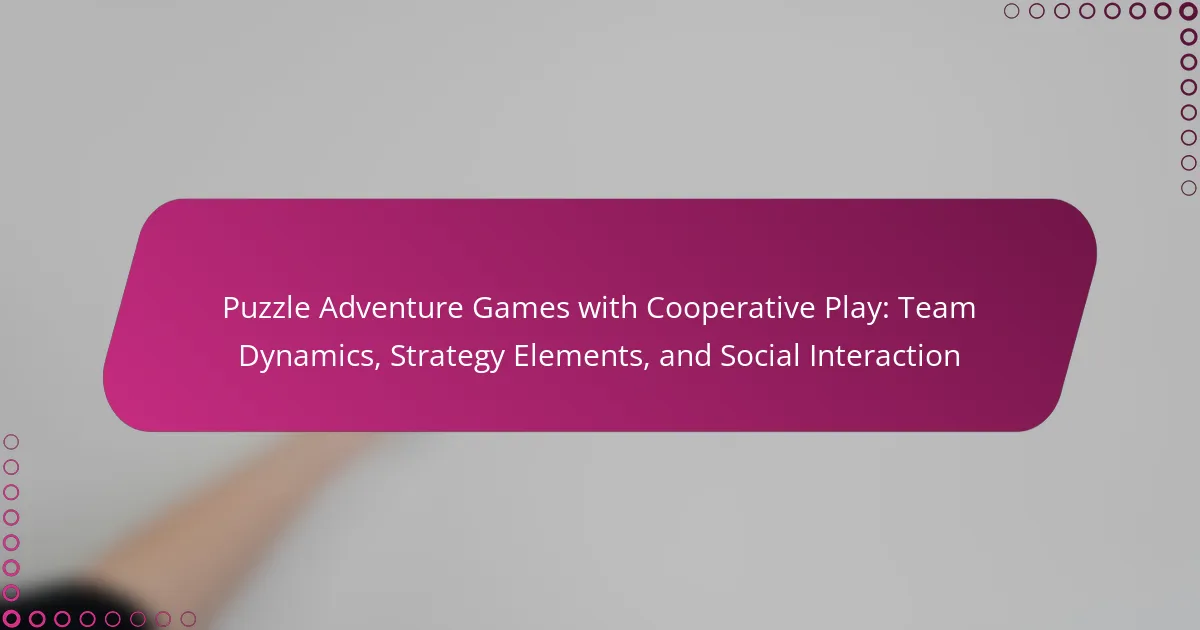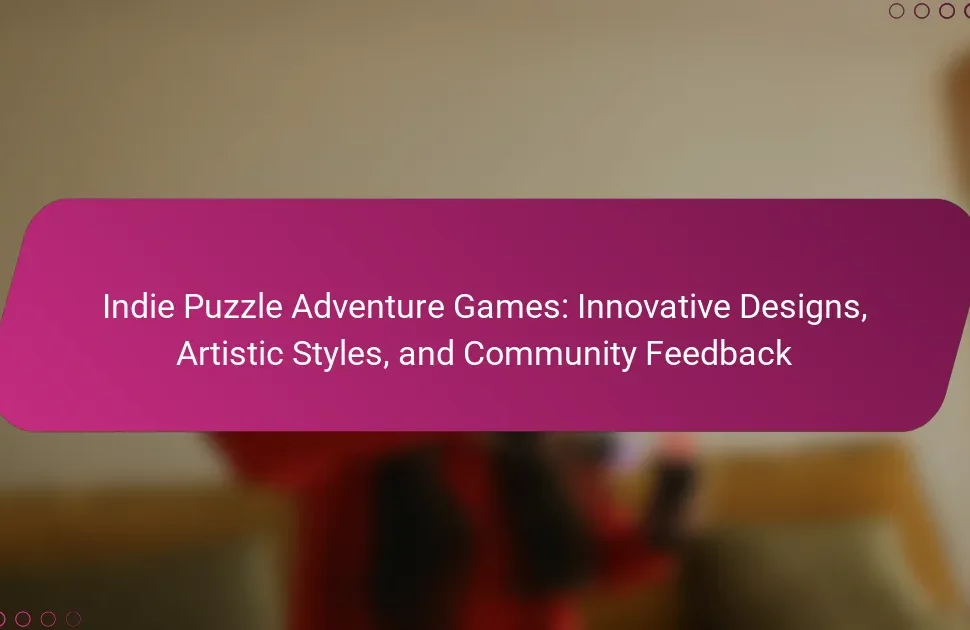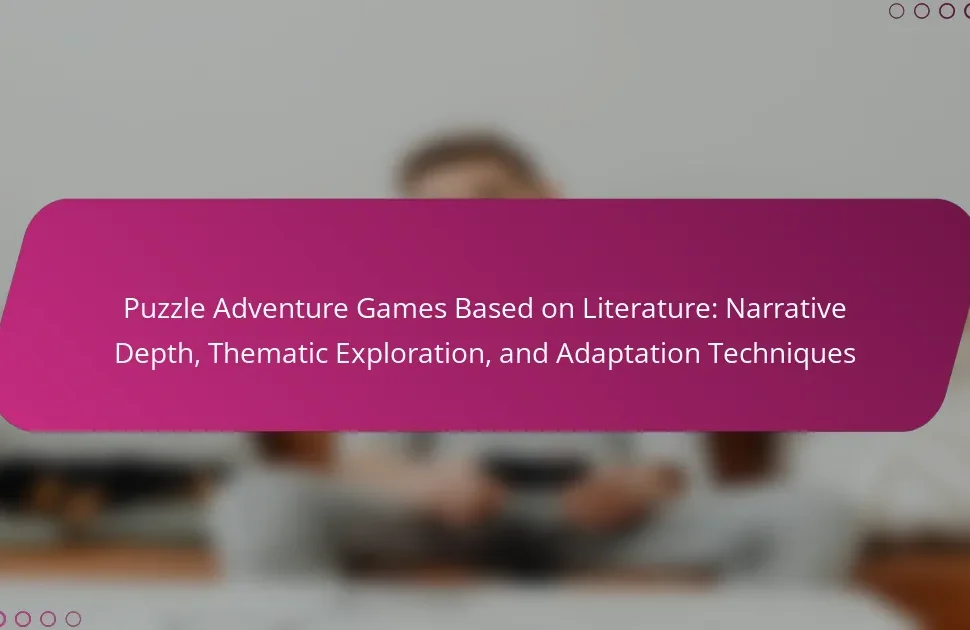Cooperative play in puzzle adventure games enhances teamwork and problem-solving skills while fostering social interaction. This article explores team dynamics, strategy elements, and the impact of cultural differences on gameplay. It highlights popular games like “Portal 2,” “Overcooked! 2,” and “Lovers in a Dangerous Spacetime,” showcasing their unique attributes that promote collaboration. Additionally, it examines rare features that elevate the cooperative experience, ensuring engaging and memorable gameplay.
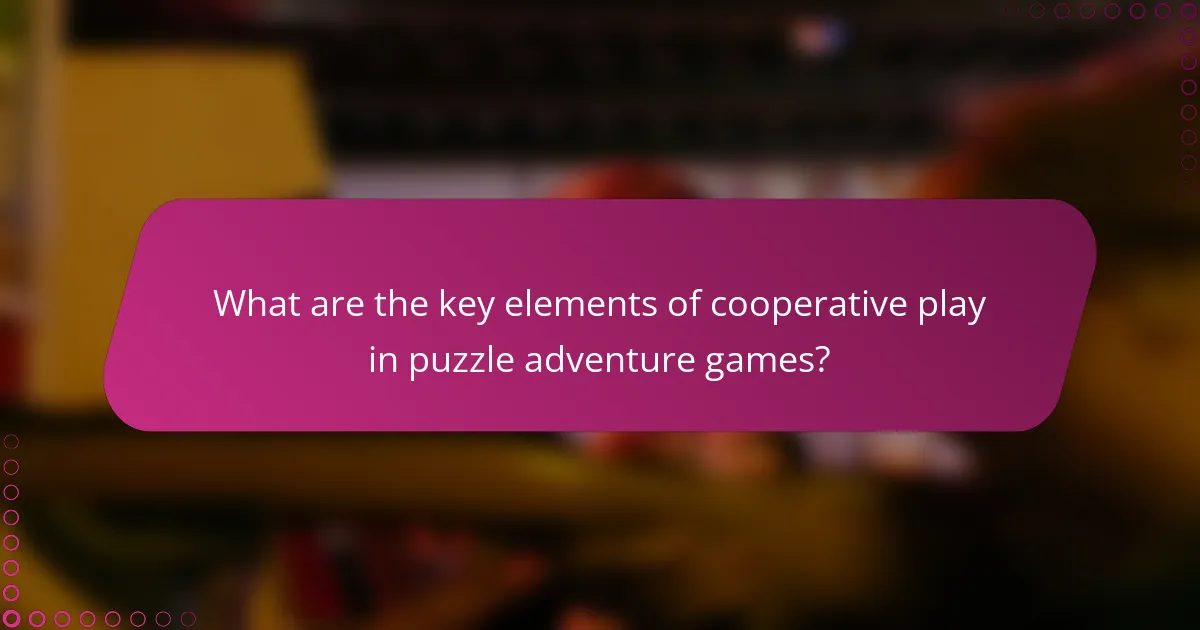
What are the key elements of cooperative play in puzzle adventure games?
Cooperative play in puzzle adventure games relies on effective team dynamics, strategic collaboration, and social interaction. Players must communicate clearly to solve puzzles, share resources, and develop strategies collectively. Team dynamics enhance problem-solving abilities, while social interaction fosters a sense of community and engagement. Strategy elements emphasize the importance of each player’s unique skills, creating a balanced approach to challenges. Together, these elements create an immersive and enjoyable gaming experience.
How do team dynamics influence gameplay experience?
Team dynamics significantly enhance the gameplay experience in puzzle adventure games. Effective collaboration fosters problem-solving and strategic planning among players. Strong communication leads to improved social interaction, allowing teams to tackle challenges more efficiently. Unique team compositions can create diverse strategies, making gameplay more engaging and enjoyable. As a result, positive team dynamics contribute to a richer gaming experience.
Which strategies enhance collaboration among players?
Effective strategies to enhance collaboration among players in puzzle adventure games include clear communication, defined roles, and shared goals. These elements foster teamwork and improve overall performance.
1. Establish clear communication channels to discuss strategies and challenges.
2. Assign specific roles based on individual strengths to optimize team dynamics.
3. Set shared goals to align efforts and create a sense of unity.
4. Encourage social interaction through in-game chats or voice communication.
5. Utilize cooperative puzzles that require teamwork to solve, promoting collaboration.
What role does communication play in solving puzzles together?
Communication is essential in solving puzzles together as it enhances collaboration and strategic planning. Effective dialogue allows team members to share insights, clarify instructions, and delegate tasks efficiently. This interaction fosters a sense of unity and boosts morale, leading to improved problem-solving capabilities. In puzzle adventure games, players often encounter complex challenges that require diverse perspectives. By discussing strategies and pooling knowledge, teams can identify solutions more quickly. Furthermore, communication helps in managing time effectively, ensuring that all players contribute to the group’s success.
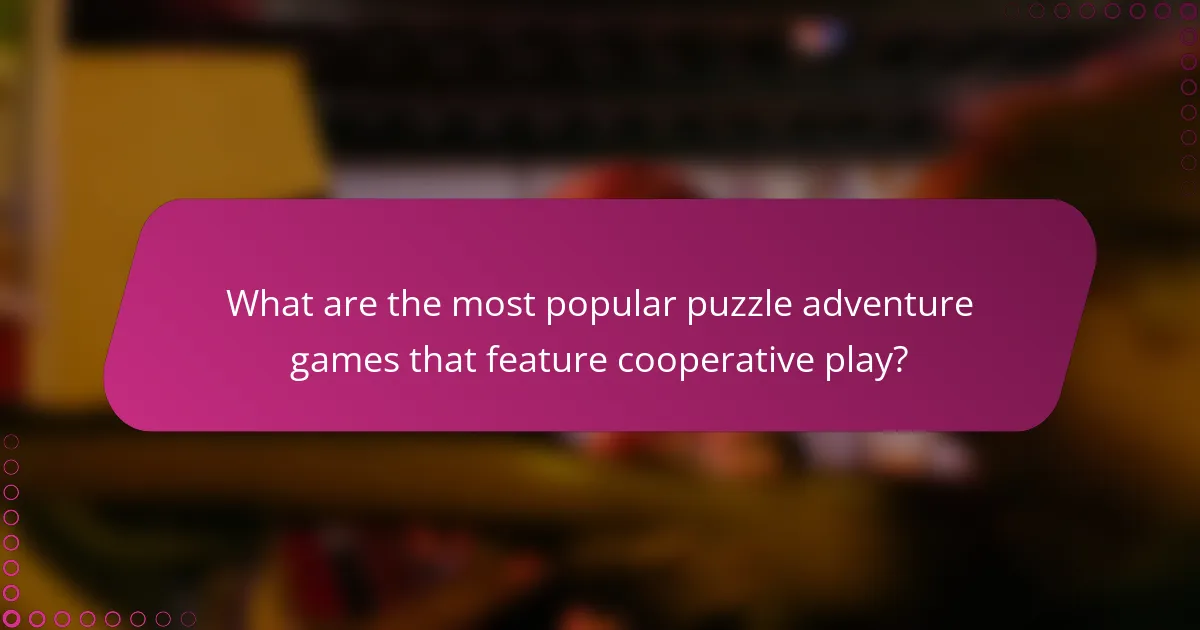
What are the most popular puzzle adventure games that feature cooperative play?
Popular puzzle adventure games featuring cooperative play include “Portal 2,” “Overcooked! 2,” and “Lovers in a Dangerous Spacetime.” These games emphasize teamwork, strategy, and social interaction, enhancing the overall gaming experience. “Portal 2” offers unique physics-based puzzles requiring collaboration, while “Overcooked! 2” focuses on time management and communication in a chaotic kitchen environment. “Lovers in a Dangerous Spacetime” combines action and puzzle-solving, demanding players to coordinate their efforts to navigate through vibrant levels. Each game showcases distinct attributes that promote cooperative gameplay, making them favorites among players seeking engaging multiplayer experiences.
Which games are known for their engaging team mechanics?
Puzzle adventure games with cooperative play are known for their engaging team mechanics. Titles like “Portal 2,” “Overcooked!,” and “Lego Marvel Superheroes” emphasize teamwork, strategic problem-solving, and social interaction. These games require players to collaborate effectively, leveraging each character’s unique abilities to progress. For example, “Portal 2” features cooperative puzzles that necessitate communication and shared strategies. “Overcooked!” challenges players to manage kitchen tasks together under time constraints, enhancing teamwork under pressure. These dynamics create memorable experiences that strengthen social bonds among players.
How do different platforms affect the cooperative experience?
Different platforms significantly influence the cooperative experience in puzzle adventure games. Each platform offers unique features that affect team dynamics, strategy elements, and social interaction.
For instance, console platforms often provide a more immersive experience with high-quality graphics and split-screen options, enhancing collaboration. In contrast, mobile platforms may emphasize accessibility and quick gameplay, which can lead to more casual interactions. PC platforms often allow for extensive customization of gameplay settings, fostering deeper strategic planning among teams.
Additionally, cross-platform capabilities can enhance social interaction by allowing players from different systems to cooperate, increasing the pool of potential teammates. The choice of platform ultimately shapes how players communicate, strategize, and engage with one another, impacting the overall cooperative experience.
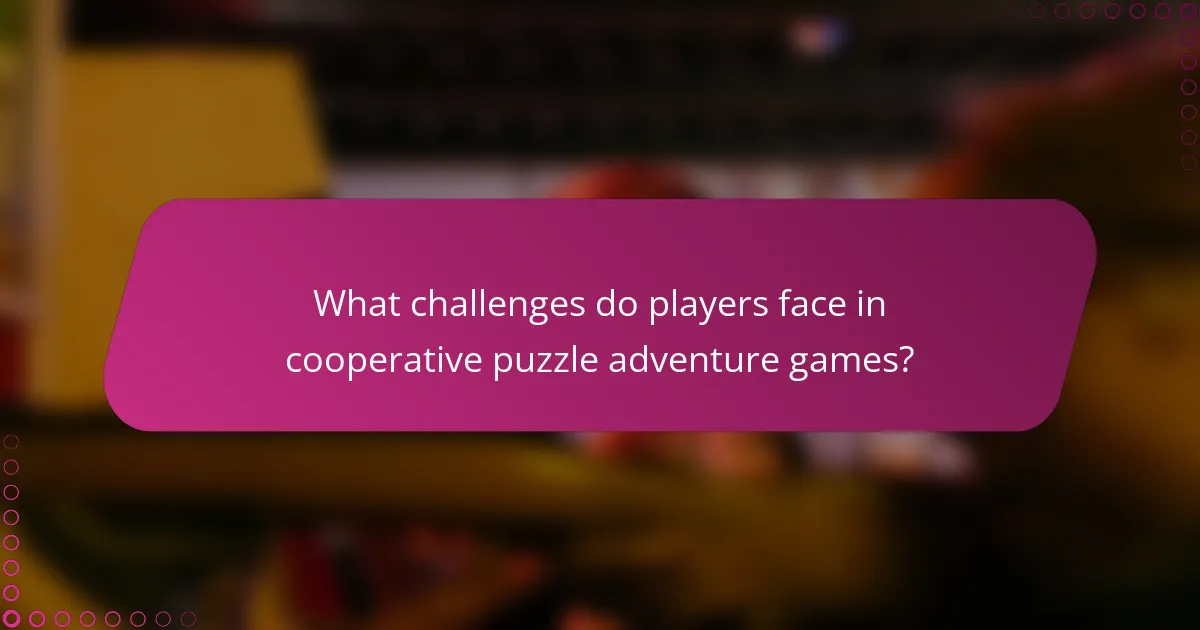
What challenges do players face in cooperative puzzle adventure games?
Players in cooperative puzzle adventure games face challenges such as communication barriers, differing problem-solving approaches, and time constraints. These dynamics can lead to frustration or inefficiency if not managed well. Effective teamwork relies on clear roles, shared strategies, and mutual support. Social interaction can enhance engagement but may also introduce conflicts if players have varying levels of experience or expectations.
How can players overcome common obstacles in teamwork?
Players can overcome common obstacles in teamwork by fostering communication, establishing roles, and practicing conflict resolution. Effective communication ensures that team members share ideas and strategies clearly. Assigning specific roles helps clarify responsibilities, enhancing efficiency in gameplay. Practicing conflict resolution techniques allows teams to address disagreements constructively, maintaining a positive dynamic. Additionally, engaging in regular team-building activities can strengthen social bonds, leading to improved collaboration.
What are the implications of varying skill levels within a team?
Varying skill levels within a team can enhance overall performance and strategy in cooperative puzzle adventure games. Diverse abilities encourage collaboration, where experienced players can guide novices, fostering social interaction and team bonding. This dynamic can lead to innovative problem-solving as players approach challenges from different perspectives. Additionally, balancing skill levels can help maintain engagement, ensuring that all players contribute meaningfully to the gameplay experience.
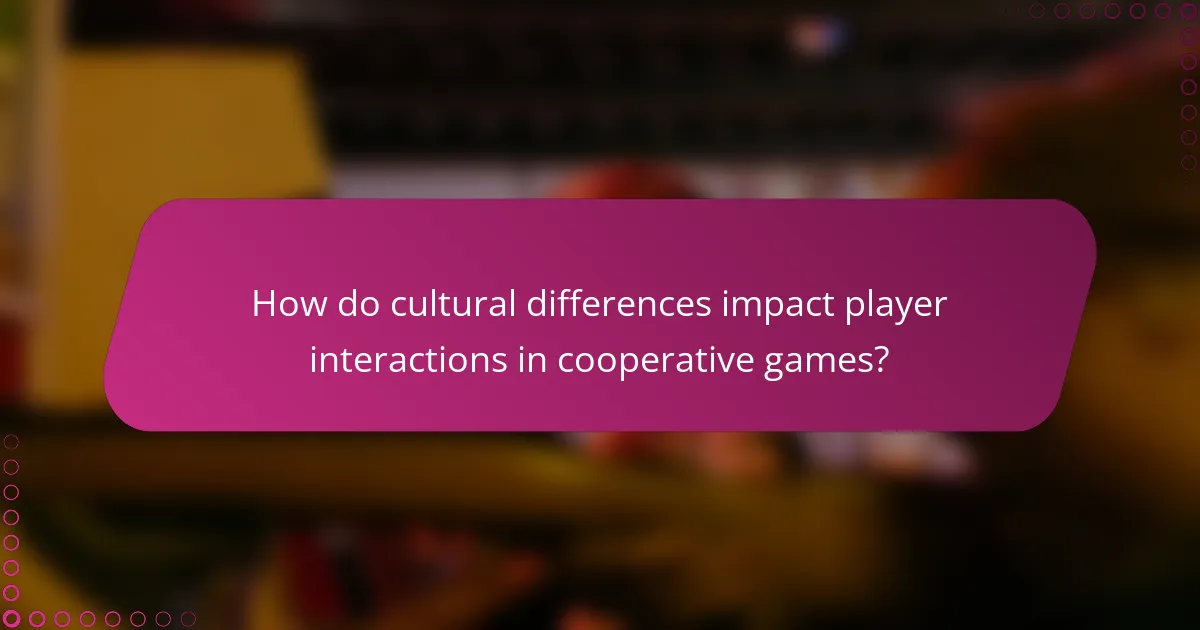
How do cultural differences impact player interactions in cooperative games?
Cultural differences significantly influence player interactions in cooperative puzzle adventure games. Players from diverse backgrounds may approach problem-solving, communication, and teamwork differently.
These variations can affect strategies and dynamics within the game. For instance, some cultures prioritize collective decision-making, while others may favor individual contributions. This can lead to misunderstandings or conflicts if not acknowledged.
Moreover, social interaction styles vary; some players may be more expressive, while others are reserved. Recognizing these differences can enhance collaboration and improve overall gameplay experience.
In summary, understanding cultural nuances fosters better teamwork and enriches the cooperative gaming experience.
Which regional preferences shape game design and player behavior?
Regional preferences significantly influence game design and player behavior in puzzle adventure games. Cultural values shape teamwork dynamics, strategic approaches, and social interactions.
For example, in collectivist cultures, players may prioritize collaboration and communication, enhancing cooperative gameplay. In contrast, individualistic cultures often emphasize personal achievement and strategy, affecting game mechanics and objectives.
Additionally, regional storytelling traditions can dictate narrative styles, influencing player engagement. Games tailored to local aesthetics and themes resonate more with players, fostering a stronger connection to the gameplay experience.
Understanding these regional nuances allows developers to create more appealing and relevant puzzle adventure games, enhancing player satisfaction and retention.
What are the social implications of cooperative gaming across different cultures?
Cooperative gaming fosters strong social interactions across cultures, enhancing teamwork and strategic thinking. Players develop shared goals, improving communication skills and cultural understanding. For example, puzzle adventure games encourage collaboration, allowing diverse players to contribute unique perspectives. This collective problem-solving reinforces social bonds and promotes inclusivity, bridging cultural divides.
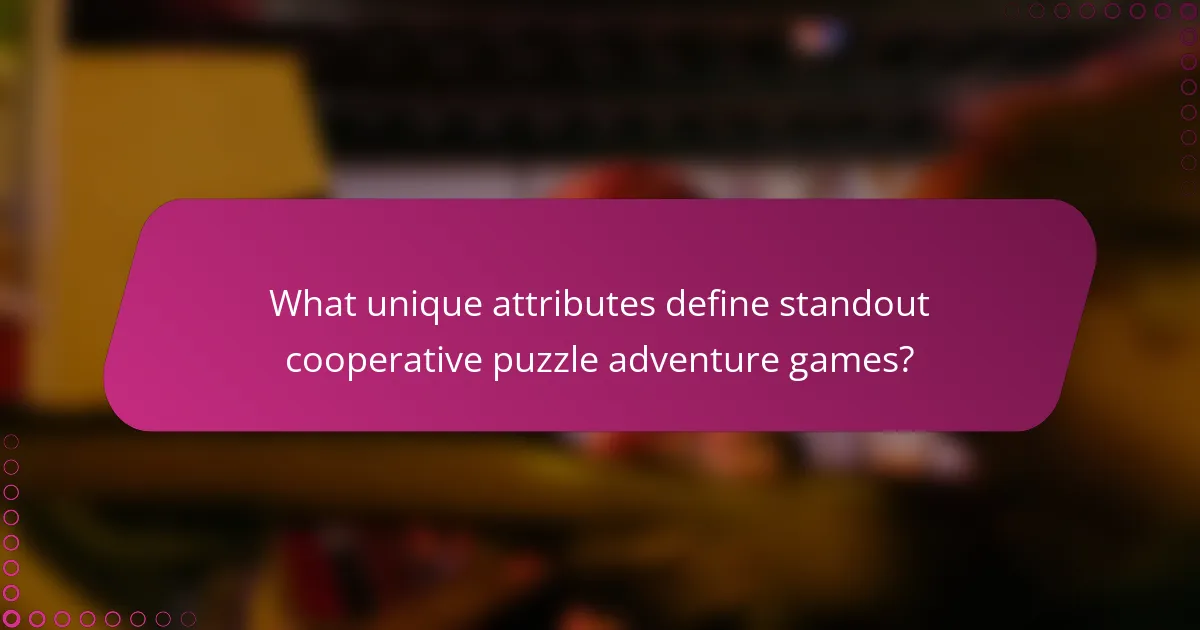
What unique attributes define standout cooperative puzzle adventure games?
Standout cooperative puzzle adventure games are defined by their emphasis on teamwork, unique problem-solving mechanics, and engaging social interactions. These games often require players to communicate effectively and strategize together to overcome challenges.
Key attributes include diverse character abilities that complement one another, non-linear gameplay that allows multiple solutions, and immersive narratives that deepen player engagement. The social aspect is enhanced through cooperative tasks that foster collaboration and shared victories.
Rarely, some games incorporate real-time elements, adding urgency to puzzles and requiring quick decision-making. Unique art styles and sound design also contribute to the overall experience, making each game distinct.
In summary, standout cooperative puzzle adventure games excel in fostering teamwork, offering varied mechanics, and creating memorable social experiences.
How do innovative mechanics differentiate these games from traditional formats?
Innovative mechanics in puzzle adventure games enhance team dynamics and strategy, setting them apart from traditional formats. These games often incorporate unique problem-solving challenges that require collaboration, fostering social interaction among players. Cooperative play mechanics encourage communication and shared decision-making, which are less emphasized in traditional formats. Additionally, elements like dynamic environments and adaptive puzzles create an engaging experience that evolves with player input, making each session distinct. This differentiation not only enhances gameplay but also builds stronger team bonds.
What narrative elements enhance the cooperative gameplay experience?
Narrative elements such as character development, immersive storytelling, and engaging dialogue enhance cooperative gameplay experiences. These elements foster teamwork, encourage strategic thinking, and promote social interaction among players. Strong narratives create emotional connections, motivating players to collaborate effectively towards shared goals. Additionally, branching storylines can lead to varied outcomes based on player choices, further enriching the cooperative experience.
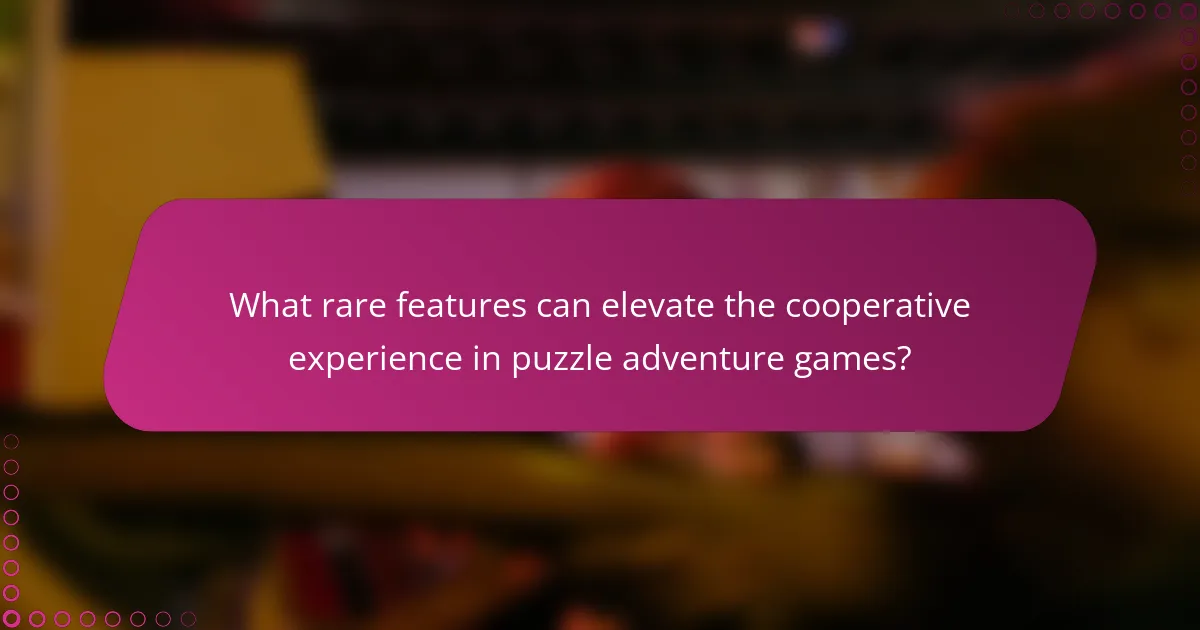
What rare features can elevate the cooperative experience in puzzle adventure games?
Rare features that can elevate the cooperative experience in puzzle adventure games include unique character abilities, dynamic environmental interactions, and adaptive puzzle difficulty. These elements foster teamwork, enhance strategy, and encourage social interaction among players. Unique character abilities allow players to contribute distinct skills, while dynamic interactions with the environment create opportunities for collaboration. Adaptive puzzle difficulty ensures challenges remain engaging, catering to varying skill levels within the team.
Which games incorporate unique problem-solving elements that require teamwork?
Puzzle adventure games that emphasize teamwork include titles like “Portal 2,” “Keep Talking and Nobody Explodes,” and “Overcooked.” These games require players to collaborate, using unique problem-solving elements to progress.
“Portal 2” features cooperative puzzles that rely on communication and strategic placement of portals. “Keep Talking and Nobody Explodes” requires one player to defuse a bomb while others provide instructions from a manual, fostering intense interaction. “Overcooked” demands players to coordinate their cooking tasks in chaotic kitchen environments, emphasizing teamwork and time management.
These games exemplify how cooperative play enhances problem-solving dynamics, making them engaging and rewarding experiences.
How do limited-time events or challenges enhance social interaction?
Limited-time events or challenges significantly enhance social interaction by fostering teamwork and collaboration. Players must communicate effectively to strategize and achieve common goals. This cooperative play strengthens team dynamics, as participants rely on each other’s strengths to overcome obstacles. The urgency of time-limited challenges encourages increased engagement and participation, creating a vibrant social atmosphere. Moreover, shared experiences during these events often lead to lasting friendships and community bonds among players.
What best practices can players adopt to maximize enjoyment and effectiveness in cooperative play?
To maximize enjoyment and effectiveness in cooperative play, players should communicate clearly, establish roles, and practice teamwork. Effective communication fosters understanding and coordination among team members. Establishing distinct roles allows players to leverage their strengths, enhancing strategy implementation. Regular practice of teamwork builds trust and familiarity, improving overall performance in puzzle adventure games.
